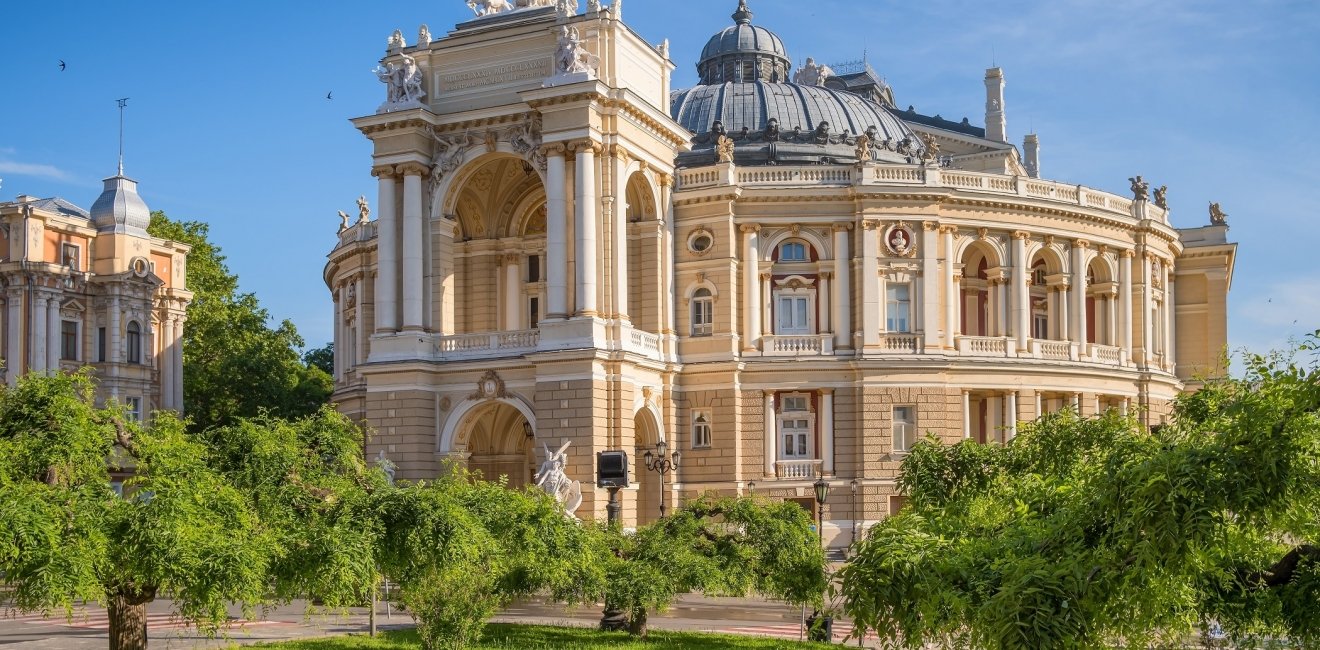
A blog of the Kennan Institute
Walking into Odesa’s magnificent opera house is to enter a fantasy world of sparkling gold and crystal, marble, and red velvet. It transports even the most jaded adult into wondrous amazement. This astonishment begins with one’s first steps into the magnificent lobby, even before one settles into a plush seat to watch a performance. Imagine how such opulence strikes a child, especially one growing up during a time of war.
A desire to transport Odesa’s war-weary children to a protected moment of beauty—even if for only an hour—prompted Lyudmila Serhiychuk, artistic director of public relations with the Odesa National Academic Theater of Opera and Ballet, to carry on its youth programs despite the war. The latest program in the theater’s Journey of a Little Musician series started just as this year’s holiday season began. For an hour, the theater’s artists took their guests on a tour of the hall in order to transport them beyond the terrors and privations of war.
Serhiychuk joined the company about a decade ago, after teaching musical theory and history at Odesa’s famed conservatory, beginning in the late 1980s. A native of Odesa, she grew up surrounded by music and became a professor, a lecturer, and a senior manager at the conservatory and then at the opera house. Her love of music, together with her own Odesan childhood, drew her to organizing and promoting programs for the city’s youth.
The opera house has long stood at the center of the city’s life (see Focus Ukraine blog post of April 28, 2023) and supported performances for young audiences. Even now, with war too often knocking at the city gates, the company has interspersed its traditional operatic repertoire with operas for young audiences such as The Emerald City, with music by Bizet, Verdi, Donizetti, Mozart, Rossini, and Humperdinck; and ballets such as Snow White, Thumbelina, and Peter Pan.
The Journey of a Little Musician series offers a more tailored experience for children. The series seeks to introduce youngsters to the theater through interactive concert programs and immersive experiences. Serhiychuk and other guides lead the children into the main hall, through the backstage, to storage areas for musical instruments. Chamber performances, as well as vocal and dance recitals, punctuate these stopovers. The tour is designed as a playful, accessible, and welcoming theater experience. The overwhelming beauty of the building makes it a friend rather than forbiddance.
The opera house’s youth programs would have deserved praise at any time. This, however, is hardly any time. Odesa has come under Russian attack with regularity since the 2022 full-scale invasion started. The city’s cultural institutions shut down for several months, and only began to open tentatively, under strict martial law restrictions, a half-year later. As Russian rockets tried to obliterate Ukrainian culture, Odesa’s diverse arts organizations, ranging from the opera and philharmonic to the Literary Museum and the musical comedy theater have mounted ever more ambitious programs.
Uniformed armed forces personnel receive deep discounts at most of these venues, as the city’s cultural community seeks to recognize and sustain the morale of those defending them on the front lines, but music programs also relieve the fright and privation of childhoods lived under attack, as Serhiychuk and her colleagues have realized. Programs like this place music at the center of a child’s future, just as the arts stood at the epicenter of Serhiychuk’s Odesan childhood, and of the childhoods of multiple generations of Odesans before her.
The Journey of a Little Musician program’s online advertisement proclaims: “Our children are the most talented in the world! Don’t miss the chance to bring future geniuses to the best!” The program looks to a time when today’s Odesa children will become tomorrow’s masterminds, who will rebuild their city and country.
The opinions expressed in this article are those solely of the author and do not reflect the views of the Kennan Institute.
Author

Former Wilson Center Vice President for Programs (2014-2017); Director of the Comparative Urban Studies Program/Urban Sustainability Laboratory (1992-2017); Director of the Kennan Institute for Advanced Russian Studies (1989-2012) and Director of the Program on Global Sustainability and Resilience (2012-2014)

Kennan Institute
The Kennan Institute is the premier US center for advanced research on Eurasia and the oldest and largest regional program at the Woodrow Wilson International Center for Scholars. The Kennan Institute is committed to improving American understanding of Russia, Ukraine, Central Asia, the South Caucasus, and the surrounding region through research and exchange. Read more

Explore More in Focus Ukraine
Browse Focus Ukraine
Turning Bombshells into Fireworks, Bullets into Raindrops

Ukraine’s Energy Sector: Resilience After Three Years of Full-Scale War


